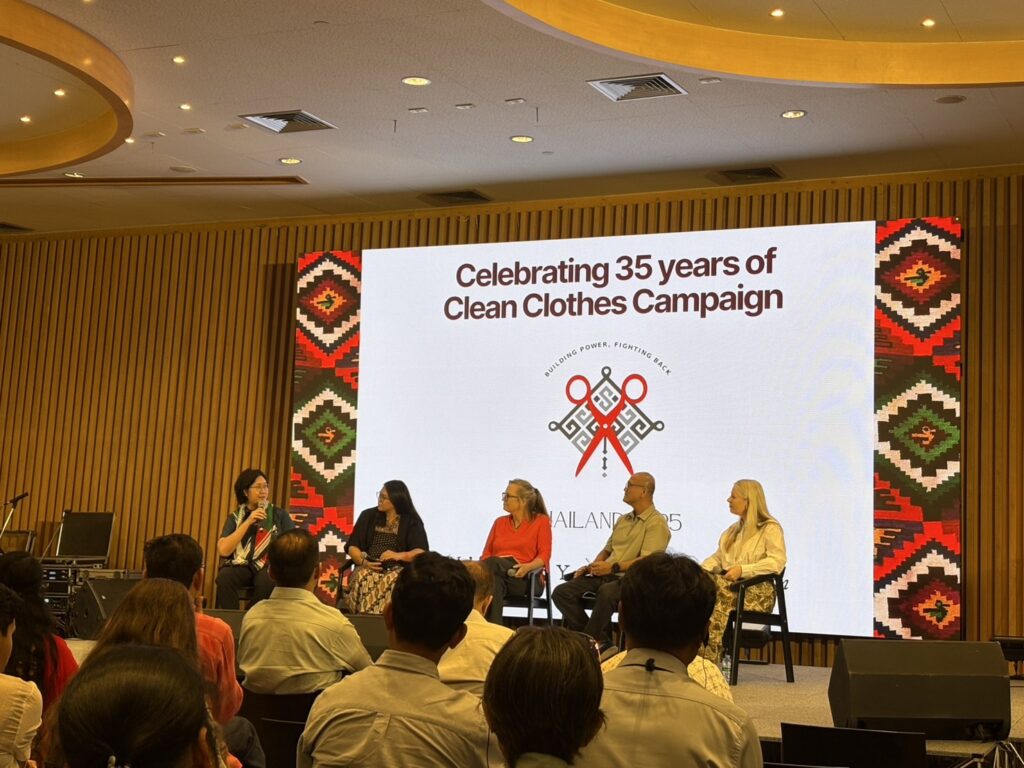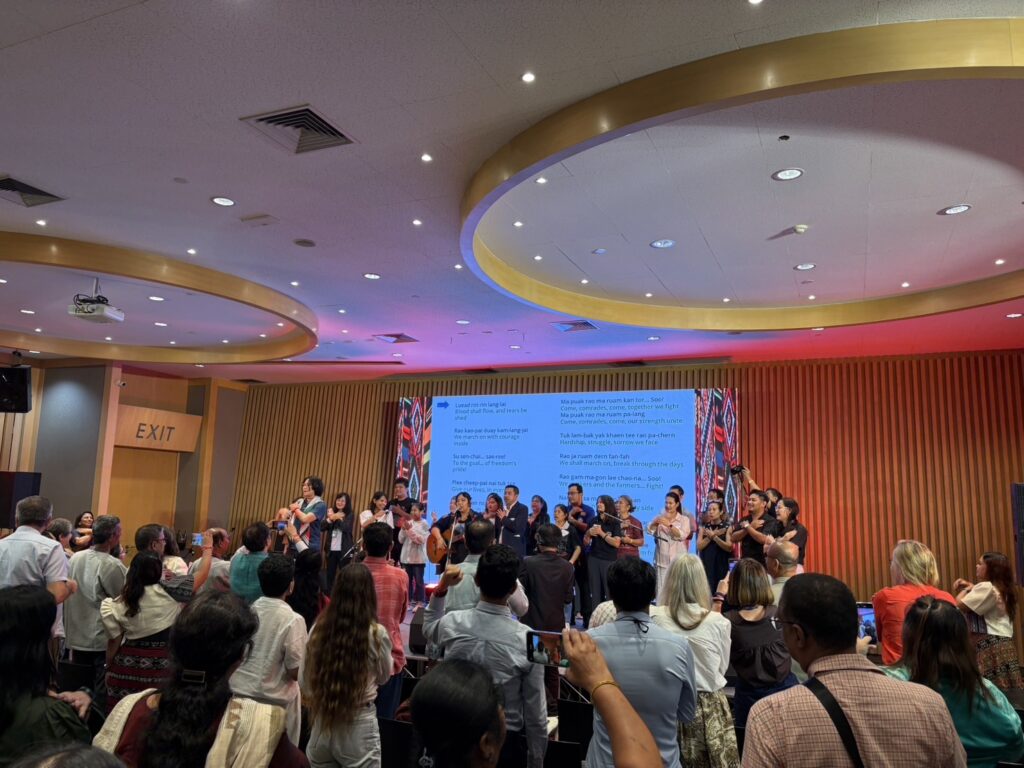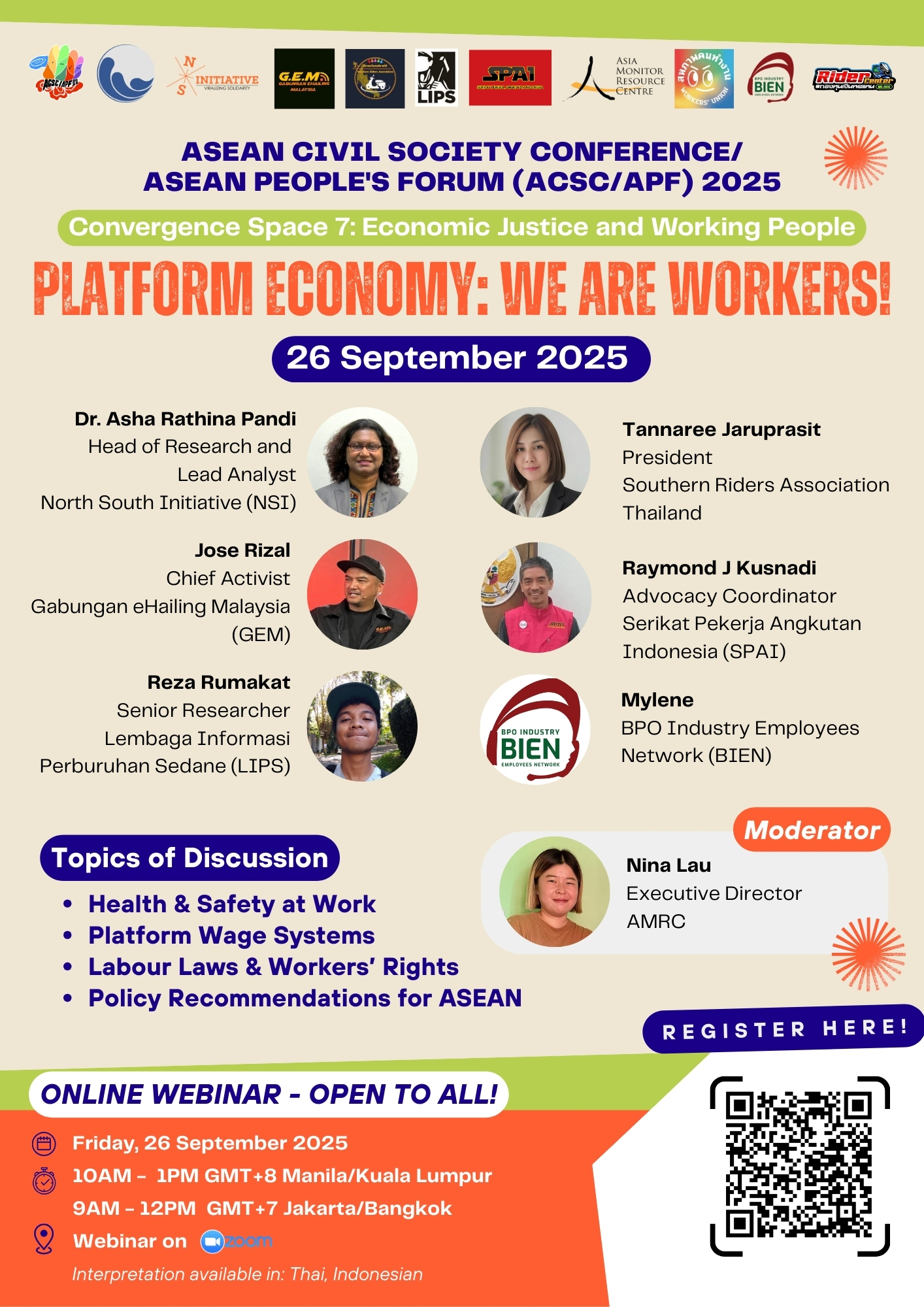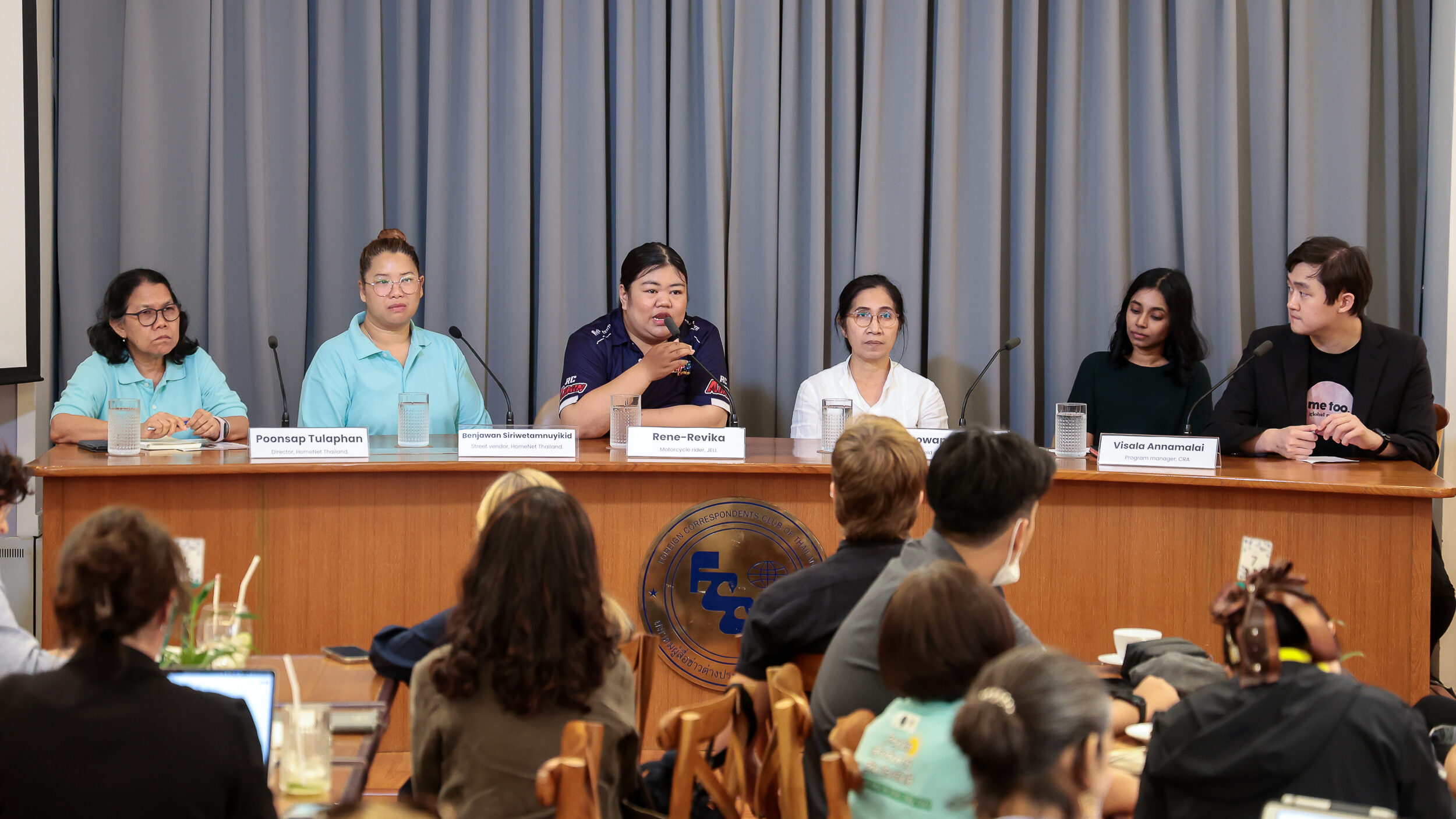(See English version below.)
งานของเรา 💪
“Build Power, Fight Back”
35 ปี Clean Clothes Campaign


เมื่อวันที่ 17 กันยายน 2568 JELI มีโอกาสได้ไปร่วมงานครบรอบ 35 ปี Clean Clothes Campaign หรือ CCC ซึ่งก่อตั้งขึ้นตั้งแต่ปี 1989 มีสมาชิกเป็นสหภาพแรงงาน NGOs กลุ่มเคลื่อนไหวต่างๆ ทั้งในยุโรป เอเชีย และภูมิภาคอื่นๆ ในอดีต 35 ปีที่ผ่านมา CCC ทำงานเพื่อมุ่งผลักดันให้เกิดการปรับปรุงสภาพการทำงานของแรงงานในอุตสาหกรรมเสื้อผ้าทั่วโลก
ในประเทศไทยเอง CCC มีส่วนร่วมอย่างมากในการแคมเปญเพื่อสิทธิแรงงาน เช่นกรณีของบริษัท Body Fashion Thailand ที่ประกาศเลิกจ้างแรงงานกว่า 900 คนในปี 2020 โดยไม่จ่ายค่าชดเชยเลิกจ้าง และเงินอื่นๆ ตามกฎหมายคุ้มครองแรงงาน เป็นจำนวนเงินกว่า 245 ล้านบาท ถึงแม้ว่าศาลแรงงานจะมีคำสั่งให้จ่ายค่าชดเชย แต่นายจ้างก็ยังคงไม่จ่ายเงินให้กับแรงงานจนถึงทุกวันนี้ นอกจากนี้ ยังมีแบรนด์สินค้าดังระดับโลกหลายแบรนด์ที่เคยสั่งสินค้าจากโรงงานดังกล่าวด้วยเช่นกัน
งานครบรอบ 35 ปีของ CCC ทำให้เราได้เรียนรู้และแลกเปลี่ยนกับเครือข่ายแรงงานจากหลายประเทศ พร้อมทั้งทบทวนเส้นทางการทำงานเพื่อสิทธิแรงงานทั้งในระดับโลกและในประเทศไทย
(เปิดแคมเปญจี้นายจ้าง-แบรนด์แฟชั่นร่วมรับผิดชอบ ‘บอดี้แฟชั่น’ ลอยแพคนงาน ค้างเงิน 245 ล้าน อ่านต่อที่ ประชาไท)
“Platform Economy: We Are Workers!”
เสวนาออนไลน์เครือข่ายแรงงานแพลตฟอร์มภูมิภาคอาเซียน

เมื่อวันที่ 26 กันยายน 2568 JELI ร่วมกับองค์กรเครือข่ายจากหลายประเทศ จัดงาน The ASEAN Civil Society Conference/ASEAN Peoples’ Forum (ACSC/APF) 2025 – Convergence Space 7: Economic Justice and Working People ในหัวข้อ “Platform Economy: We Are Workers!” การเสวนาครั้งนี้มีเป้าหมายเพื่อเป็นเวทีแลกเปลี่ยนประสบการณ์จากแรงงาน นักวิชาการ และนักกิจกรรมทั่วอาเซียนว่าด้วยอุตสาหกรรมแพลตฟอร์ม โดยเน้นประเด็นสุขภาพและความปลอดภัยในการทำงาน ระบบค่าจ้าง กฎหมายและสิทธิแรงงาน และข้อเสนอเชิงนโยบายต่ออาเซียน
ตัวแทนจากประเทศมาเลเซียเล่าถึงกฎหมาย Gig Worker Bill 2025 ซึ่งออกมาเพื่อรับรองสถานะของแรงงานกิ๊ก แต่ก็ยังเต็มไปด้วยข้อจำกัด เช่น สถานะการคุ้มครองด้านสุขภาพและความปลอดภัยยังคงจำกัดอยู่แค่ประกันสังคมสำหรับผู้ประกอบอาชีพอิสระ (Self-Employment Social Security Scheme) ขาดสิทธิประโยชน์ด้านประกันสุขภาพและการลาป่วย ระบบค่าจ้างก็ยังถูกกำหนดโดยอัลกอริทึมของแพลตฟอร์มอย่างไม่โปร่งใส คนงานไม่รู้ว่าค่ารอบถูกคำนวณอย่างไร ไม่มีการการันตีค่าแรงขั้นต่ำ ขณะเดียวกันค่าใช้จ่ายรายวัน เช่น น้ำมันและค่าซ่อมบำรุงยานพาหนะของไรเดอร์ ก็สูงขึ้นสวนทางกับรายได้ ข้อเรียกร้องหลักของคนงานขณะนี้คือการสร้างระบบค่าจ้างที่เปิดเผย โปร่งใส และการันตีรายได้ที่ชัดเจน ไม่ว่าจะคำนวณต่อรอบ ต่อชั่วโมง หรือระยะทาง
สำหรับไรเดอร์ในอินโดนีเซียยังเผชิญอุบัติเหตุและบาดเจ็บรายวัน รวมถึงปัญหาสุขภาพจากฝุ่นควันและการทำงานกลางคืน ขณะที่ปัญหาสุขภาพจิตก็รุนแรงขึ้นจากการถูกคุกคามทั้งทางวาจา ร่างกาย และทางเพศ แต่บริษัทกลับเรียกไรเดอร์ว่า “พาร์ทเนอร์” ทำให้ไม่สามารถเข้าถึงสิทธิขั้นพื้นฐานอย่างประกันสังคมหรือสิทธิการลาป่วยได้ ข้อเรียกร้องหลักของคนงานคือให้บริษัทจัดหาอุปกรณ์ป้องกันคุณภาพดี จัดประกันอุบัติเหตุและสุขภาพ รวมถึงรับผิดชอบต่อรายได้ที่สูญเสียเมื่อเกิดอุบัติเหตุ และยังมีข้อเรียกร้องให้เพิ่มค่ารอบขั้นต่ำเป็น 31,000 รูเปียต่อชั่วโมง จัดสิทธิลาคลอดสำหรับไรเดอร์หญิง และให้บริษัทมีส่วนร่วมในค่าใช้จ่ายด้านเชื้อเพลิงและซ่อมบำรุง
ในฟิลิปปินส์ คนงานจำนวนมากทำงานแพลตฟอร์มจากที่บ้าน (Home-Based Platform Workers) โดยเฉพาะงานสายคอลเซ็นเตอร์ ด้วยความสามารถด้านภาษาอังกฤษที่เป็นจุดแข็งของคนงานฟิลิปปินส์ทำให้บริษัทต่างชาติมักเอาเปรียบ ไม่เคารพชั่วโมงการทำงาน คนงานต้องทำงานยาวถึง 60-80 ชั่วโมงต่อสัปดาห์โดยไม่มีค่าล่วงเวลา และไม่มีประกันสุขภาพ ผลที่ตามมาคือความเครียดและปัญหาสุขภาพจิต ขณะเดียวกันค่าจ้างก็ไม่เพียงพอ เนื่องจากแพลตฟอร์มหักค่าคอมมิชชันสูงโดยไม่โปร่งใส และการจัดสถานะทางกฎหมายที่เป็นเพียง Contractor หรือ Freelance ยิ่งทำให้ไม่สามารถเข้าถึงความคุ้มครองแรงงานได้
สถานการณ์ของไรเดอร์ไทยใกล้เคียงกับอินโดนีเซีย ต้องทำงานท่ามกลางสภาพอากาศแปรปรวน เสี่ยงอุบัติเหตุและปัญหาสุขภาพ โดยมีกรณีไรเดอร์ในจังหวัดเชียงใหม่ที่ทั้งเสียชีวิตและบาดเจ็บสาหัสจากอุบัติเหตุที่เกิดจากการทำงานหนักและความเครียด แต่บริษัทแพลตฟอร์มที่เกี่ยวข้องกลับไม่ต้องรับผิดชอบใดๆ ประกันที่จัดไว้ก็ตั้งเงื่อนไขจนใช้งานจริงไม่ได้ อีกทั้งค่ารอบก็ถูกปรับลดลงเรื่อยๆ ทำให้ไรเดอร์ต้องทำงานเพิ่มจาก 8 ชั่วโมงต่อวันเป็น 12 ชั่วโมง แต่รายได้ไม่ได้เพิ่มขึ้น ในด้านกฎหมาย ไรเดอร์ยังไม่ถูกจัดให้เป็นลูกจ้างจึงไม่ได้รับสิทธิตามกฎหมายแรงงาน แม้ความสัมพันธ์การจ้างงานจะถูกควบคุมโดยแพลตฟอร์มชัดเจน ล่าสุด กระทรวงแรงงานได้ผลักดันร่าง พ.ร.บ. คุ้มครองและส่งเสริมแรงงานอิสระ จัดสรรไรเดอร์เป็น “แรงงานกึ่งอิสระ” ซึ่งจะทำให้ไรเดอร์ถูกตัดออกจากความสัมพันธ์ลูกจ้าง-นายจ้างโดยสิ้นเชิง
การเสวนาปิดท้ายด้วยการแลกเปลี่ยนข้อเสนอเชิงนโยบายต่ออาเซียนร่วมกัน ผู้เข้าร่วมต่างเห็นพ้องถึงความจำเป็นในการกำหนดสถานะทางกฎหมายที่รับรองความเป็น “แรงงาน” ของคนทำงานแพลตฟอร์ม กำหนดมาตรฐานค่าจ้างที่เป็นธรรม ความโปร่งใสของอัลกอริทึม และเรียกร้องให้มีกฎหมายและมาตรการที่ชัดเจนต่อการคุ้มครองสุขภาพ ความปลอดภัย และสิทธิในการรวมกลุ่มของแรงงาน ซึ่งการร่วมกันผลักดันประเด็นเหล่านี้ในระดับภูมิภาคจะช่วยสร้างความมั่นคงให้แก่แรงงานแพลตฟอร์ม และเป็นจุดเริ่มต้นของการมีส่วนร่วมในการกำหนดนโยบายของทั้งรัฐบาลและบริษัทแพลตฟอร์มในอนาคต
วงเสวนา “ผู้หญิงกับความร้อนสูง”

ต่อเนื่องจากความร่วมมือระหว่าง JELI และ Climate Resilience for All ในการจัด Focus Group Discussion เพื่อสำรวจผลกระทบจากความร้อนสูง (Extreme Heat) ที่มีต่อคนงานหญิงมาตลอดช่วงหลายเดือนที่ผ่านมา เมื่อวันที่ 29 กันยายน 2568 JELI และตัวแทนไรเดอร์ที่ได้เข้าร่วม FGD “เรเน่-เรวิกา” ได้เข้าร่วม Panel Discussion ในหัวข้อ “Women on the Frontlines of Heat” ณ สมาคมผู้สื่อข่าวต่างประเทศแห่งประเทศไทย (FCCT) ซึ่งงานในครั้งนี้เป็นกิจกรรมส่วนหนึ่งของ Bangkok Climate Action Week ที่จัดขึ้นต่อเนื่องในกรุงเทพฯ ตลอดช่วงเดือนกันยายนและตุลาคม
งานในครั้งนี้ถือเป็นโอกาสพิเศษและพื้นที่สำคัญเพื่อ JELI ได้แชร์ข้อค้นพบจากการแลกเปลี่ยนเชิงลึกกับคนงานหญิงกว่า 100 คน ในกรุงเทพฯ สมุทรสงคราม ปทุมธานี และนนทบุรี ตั้งแต่เดือนมิถุนายนเป็นต้นมา และถ่ายทอดประสบการณ์จริงโดยไรเดอร์ที่เป็นผู้ได้รับผลกระทบอย่างหนักโดยตรงจากความร้อนสูงตลอดทั้งวัน ซึ่งนอกจากจะส่งผลเสียต่อสุขภาพกายแล้ว อีกหนึ่งปัญหาที่หนักหน่วงแต่มักไม่ได้รับสนใจเท่าที่ควรก็คือสุขภาพจิต ด้าน HomeNet Thailand ก็ได้แชร์ถึงสถานการณ์ที่ใกล้เคียงกันของแม่ค้าหาบเร่-ขายอาหาร ที่ความร้อนส่งผลต่อการทำมาหากิน สภาพจิตใจและกายที่เหนื่อยล้า จนกระทั่งส่งผลต่อความสัมพันธ์ในครอบครัว รวมถึงทุกด้านของชีวิต
คนงานหญิงเหล่านี้ทำงานอย่างหนัก เป็นฟันเฟืองที่สำคัญในการพัฒนาเศรษฐกิจไทย แต่กลับไม่ได้รับความคุ้มครองอย่างทั่วถึง ทั้งการลาคลอด การคลอดบุตร อุดหนุนช่วยเหลือการเลี้ยงดูบุตร รวมไปถึงสภาพการทำงานที่สาหัส ความเจ็บป่วยและผลกระทบทางการเงินที่เกิดจากความร้อน
ข่าวสำคัญ 📰
นายอนุทิน ชาญวีรกูล เข้าเฝ้าฯ ถวายสัตย์ปฏิญาณก่อนเข้ารับหน้าที่นายกรัฐมนตรีคนที่ 32 ของไทย แถลงข่าวเปิดแนวนโยบายสำคัญของรัฐบาลเฉพาะกิจ พร้อมให้คำมั่นสัญญาจะ “คืนอำนาจให้ประชาชน” ได้เลือกตั้งและลงประชามติเกี่ยวกับการจัดทำรัฐธรรมนูญใหม่ ในเดือน มี.ค. – เม.ย. 2569 อ่านที่: BBC News
ที่ประชุมสมาชิกวุฒิสภาลงมติเอกฉันท์ ผ่านร่างแก้ไข พ.ร.บ.คุ้มครองแรงงาน เพิ่มสิทธิลาคลอด 120 วัน อ่านที่: ประชาไท
ศาลปกครองสูงสุดฟินแลนด์ (KHO) ตัดสิน ไรเดอร์ส่งอาหารเป็น “ลูกจ้าง” ไม่ใช่นักธุรกิจหรือผู้ประกอบการอิสระ อ่านที่: สหภาพคนทำงาน
สภาฯ มีมติเห็นชอบรับหลักการ ร่างแก้ไข พ.ร.บ.คุ้มครองแรงงาน 2 ฉบับ ที่เสนอโดย ปชน. ขยับสิทธิแรงงาน ทำงาน 40 ชม.ต่อสัปดาห์ วันหยุดประจำสัปดาห์ไม่น้อยกว่า 2 วัน สิทธิลาปวดประจำเดือน และลาไปดูแลคนที่รักได้ 15 วันต่อปี อ่านที่: ประชาไท
เรื่องเล่ารายเดือน ✍️
สหภาพแรงงานจากโครเอเชียกับการจัดตั้งแรงงานแพลตฟอร์ม
เมื่อวันที่ 17 กันยายน JELI ได้ไปร่วมงานครบรอบ 35 ปี ของ Clean Clothes Campaign ที่หอศิลป์ฯ กรุงเทพ และได้พบกับ Mario Iveković ประธานสหภาพแรงงาน Novi Sindikat จากประเทศโครเอเชีย ซึ่งสหภาพนี้กำลังทำงานจัดตั้งแรงงานแพลตฟอร์มและเคลื่อนไหวเพื่อสิทธิแรงงานของไรเดอร์ JELI เลยถือโอกาสเรียนรู้ทำความเข้าใจสถานการณ์ของแรงงานแพลตฟอร์มในโครเอเชีย ซึ่ง Mario ก็ได้เล่าให้ฟังถึงบทบาทของ Novi Sindikat ทั้งในการเคลื่อนไหวทำกิจกรรม การผลักดันเปลี่ยนแปลงกฎหมาย และการจัดตั้งสมาชิกในระบบเศรษฐกิจแพลตฟอร์ม
บริบทแรงงานในโครเอเชีย มีระบบสหภาพที่ค่อนข้างกระจัดกระจาย มีคนเป็นสมาชิกแค่ 25% จากแรงงานทั้งหมดราว 1.8 ล้านคน ส่วนสหภาพ Novi Sindikat มีสมาชิกอยู่ประมาณ 4,000 คน แต่ขับเคลื่อนกิจกรรมแรงงานถึงกว่า 50% ของประเทศในช่วง 10 ปีที่ผ่านมา สหภาพเริ่มมีแรงงานแพลตฟอร์มโดยเฉพาะไรเดอร์ส่งอาหารเข้ามาเป็นสมาชิกมากขึ้น ปัจจุบันมีประมาณ 50 คน ซึ่งเป็นกลุ่มสำคัญในการจะผลักดันนโยบายและการเปลี่ยนแปลงโครงสร้างการจ้างงานในแพลตฟอร์ม
แพลตฟอร์มเดลิเวอรีที่ครองตลาดโครเอเชียมีอยู่ 4 เจ้าหลัก คือ Wolt, Bolt, Uber และ Glovo แพลตฟอร์มเหล่านี้หลีกเลี่ยงการจ้างงานแบบปกติ โดยให้ไรเดอร์จดเป็น “ผู้ประกอบการรายย่อย” หรือทำงานผ่านซับคอนแทรกเตอร์ แพลตฟอร์มโฆษณาว่าเป็นการให้ความยืดหยุ่นในการทำงาน แต่ความจริง ไรเดอร์ยังต้องวิ่งงานวันละ 10-12 ชั่วโมง ไม่มีวันหยุด รายได้ไม่ถึงค่าแรงขั้นต่ำ และไม่มีสวัสดิการใดๆ ซึ่งจุดหนึ่งก็ไม่ต่างกับสถานการณ์ไรเดอร์ในประเทศไทย
ในช่วงหลัง รัฐบาลโครเอเชียเปิดตลาดแรงงานเต็มที่ ทำให้มีแรงงานข้ามชาติเข้ามาร่วม 200,000 คน ซึ่งกว่า 40,000 คนทำงานในระบบแพลตฟอร์ม ไม่ว่าจะเป็นไรเดอร์ คนขับแท๊กซี่ หรืออาชีพอื่นๆ โดยเฉพาะแรงงานจากเนปาล อินเดีย และบังกลาเทศ ซึ่งมักไม่เข้าใจกฎหมาย พูดภาษาท้องถิ่นไม่ได้ และถูกเอารัดเอาเปรียบทั้งในประเทศต้นทางและปลายทาง
ช่วงแรก ไรเดอร์ท้องถิ่นชาวโครเอเชียพยายามจะตั้งสหภาพขึ้นเองแต่ขาดประสบการณ์ หลังจากการประท้วงในปี 2022 Novi Sindikat ได้เข้าไปสนับสนุนและเสนอให้ไรเดอร์เข้าร่วมกับสหภาพ นำไปสู่ความร่วมมือระยะยาวและการจัดตั้งแรงงานกลุ่มนี้อย่างจริงจัง โดยใช้กลยุทธ์หลากหลาย ทั้งจัดทำใบปลิวหลายภาษา ใช้ WhatsApp เป็นช่องทางสื่อสาร เข้าหาแรงงานผ่านกิจกรรมประท้วง และที่สำคัญคือ การเข้าไปช่วยเหลือแก้ปัญหารายเคส เช่น เคสแรงงานหญิงชาวอินเดียที่ถูกตำรวจยึดเอกสารให้ได้เอกสารคืน
ในปี 2024 การประท้วงของไรเดอร์มีแรงงานข้ามชาติร่วมถึง 150 คน จาก 200 คนทั้งหมด ถือเป็นจุดเปลี่ยนสำคัญของขบวนการแรงงานในโครเอเชีย Mario เล่าว่า ถ้าระดมแรงงานข้ามชาติได้อย่างน้อย 100 คนไปประท้วงหน้าสถานีตำรวจเพื่อกดดันให้เจ้าหน้าที่รับผิดชอบต่อความล่าช้าในการจัดการเคสแรงงาน คาดว่าจะสร้างแรงสั่นสะเทือนได้ทั้งระบบ
ในด้านนโยบาย สหภาพฯ ผลักดันให้แก้กฎหมายหลายฉบับ เช่น เปลี่ยนใบอนุญาตทำงานให้เป็น 2 ปี และอนุญาตให้เปลี่ยนงานได้ภายใน 2 เดือน ถ้านายจ้างละเมิดสิทธิ หรือการผลักดันให้รัฐบาลตั้งมาตรฐานเรื่องที่พักแรงงานข้ามชาติ โดยใช้เกณฑ์เดียวกับแรงงานตามฤดูกาล
ส่วนประเด็นที่ยังต้องสู้ต่อ เช่น “เวลาทำงาน” ที่แพลตฟอร์มนับแค่เวลาส่งของ ไม่รวมเวลารอหรือเดินทางกลับ การที่แพลตฟอร์มโยนความรับผิดชอบให้นายจ้างรายย่อยโดยตัวเองไม่รับผิดชอบอะไรเลย และการที่แม้จะมีกฎหมายคุ้มครองแต่ไม่มีการบังคับใช้จริง Mario มองว่า การต่อสู้เรื่องแรงงานแพลตฟอร์มจำเป็นต้องมีความร่วมมือระหว่างสหภาพแรงงานกับ NGO เพราะแต่ละฝ่ายมีข้อได้เปรียบที่ต่างกัน และหากทำงานร่วมกันได้จะเป็นพลังสำคัญในการเปลี่ยนแปลง
บทเรียนจากโครเอเชียอาจไม่ได้ให้คำตอบสำเร็จรูป และมีบริบทที่ต่างจากไทย แต่ก็เป็นอีกตัวอย่างให้เห็นว่าความเปลี่ยนแปลงเริ่มต้นจากการลงมือจัดตั้ง แม้จะต้องใช้ทั้งเวลา ความเชื่อใจ และความร่วมมือจากหลายภาคส่วนอย่างต่อเนื่อง
Our Work This Month 💪
“Build Power, Fight Back”
35 Years of Clean Clothes Campaign


On September 17, 2025, JELI joined the 35th anniversary of the Clean Clothes Campaign (CCC), founded in 1989 as a global network of trade unions, NGOs, and activist groups across Europe, Asia, and beyond. For the past 35 years, CCC has been at the forefront of efforts to improve working conditions in the garment industry worldwide.
In Thailand, CCC has played a vital role in labor rights campaigns, such as the Body Fashion Thailand case, where more than 900 workers were laid off in 2020 without receiving legally mandated severance and benefits totaling over 245 million baht. Although the Labor Court ruled in favor of the workers, the company has refused to pay, leaving them uncompensated to this day. Several major international brands had also sourced from this factory, yet none have stepped up to share responsibility.
This anniversary was not only a celebration of CCC’s long struggle for justice, but also a moment to reconnect with labor networks worldwide and reflect on what these campaigns mean for the future of workers’ rights, both globally and here in Thailand.
Learn more: Campaign urging employers and fashion brands to take responsibility in the Body Fashion case (Prachatai)
“Platform Economy: We Are Workers!”

On September 26, JELI, together with labor networks from across the region, co-organized The ASEAN Civil Society Conference/ASEAN Peoples’ Forum (ACSC/APF) 2025 – Convergence Space 7: Economic Justice and Working People under the theme Platform Economy: We Are Workers!” The dialogue served as a platform for workers, academics, and activists to exchange experiences and discuss the realities of platform work in ASEAN, with a focus on occupational health and safety, wage systems, labor laws, and regional policy recommendations.
Representatives from Malaysia shared insights on the Gig Worker Bill 2025, which formally recognizes gig workers but leaves major gaps. Health and safety protections remain limited to the Self-Employment Social Security Scheme, excluding healthcare and sick leave benefits. Wage systems are still dictated by opaque platform algorithms, with workers having no clarity on how rates are calculated and no guarantee of a minimum wage. At the same time, daily expenses such as fuel and vehicle maintenance continue to rise, pushing workers into greater financial insecurity. Their key demand is for a transparent, fair wage system that guarantees a clear baseline income, whether calculated per trip, per hour, or by distance.
Indonesian riders continue to face daily risks of accidents and injuries, as well as long-term health issues from pollution and night work. Mental health challenges are compounded by verbal, physical, and sexual harassment. Yet platforms insist on calling riders “partners,” denying them access to basic protections such as social security and sick leave. Workers are calling for quality protective gear, accident and health insurance, compensation for lost income due to work-related accidents, a guaranteed minimum fare of 31,000 rupiah per hour, maternity leave for women riders, and company contributions to fuel and vehicle maintenance costs.
In the Philippines, many home-based platform workers, particularly in call-center-related jobs, face severe exploitation. Leveraging Filipino workers’ English-language skills, international companies impose grueling schedules of 60-80 hours per week with no overtime pay and no health insurance. This has led to widespread stress and mental health problems. At the same time, wages remain insufficient due to high, non-transparent commission fees deducted by platforms. With their legal classification restricted to “contractors” or “freelancers,” workers are excluded from labor protections altogether.
Conditions for Thai riders mirror many of the challenges seen in Indonesia. Riders work long hours in dangerous weather, facing high risks of accidents and health issues. In Chiang Mai, there have been cases of riders dying or being severely injured from work-related accidents, yet platforms have avoided any responsibility. Insurance policies set up by companies are full of restrictions, making them nearly impossible to use. Meanwhile, fare rates have been steadily cut, forcing riders to work 12-hour days, with no real increase in income. Legally, riders are still not recognized as employees and thus remain excluded from labor law protections, even though platforms exercise clear control over their work. Most recently, the Ministry of Labour has introduced a draft Independent Workers Promotion and Protection Bill, which classifies riders as “semi-independent workers.” This risks cutting them off entirely from employee-employer protections.
The session concluded with collective policy recommendations for ASEAN. Participants agreed on the urgent need to legally recognize platform workers as “workers,” set fair and transparent wage standards, ensure algorithmic accountability, and adopt strong laws and measures to guarantee occupational health, safety, and the right to organize. Coordinated regional advocacy, they emphasized, will be crucial to strengthening protections for platform workers and ensuring that both governments and platforms are held accountable in shaping fairer policies for the future.
Women on the Frontlines of Heat

Building on JELI’s collaboration with Climate Resilience for All to explore how extreme heat is affecting women workers, JELI together with rider representative Rene-Revika joined the panel “Women on the Frontlines of Heat” at the Foreign Correspondents’ Club of Thailand (FCCT) on September 29. The event was part of Bangkok Climate Action Week, which has been running throughout September and October in Bangkok.
The panel provided a crucial space for JELI to share insights from months of focus group discussions with more than 100 women workers in Bangkok, Samut Songkhram, Pathum Thani, and Nonthaburi. It also brought forward the voice of a rider who experiences the brunt of the heat daily. Beyond the obvious toll on physical health, the discussions revealed another pressing but often overlooked issue: mental health.
Echoing these realities, HomeNet Thailand highlighted similar challenges faced by street vendors and food sellers. Prolonged exposure to high heat is exhausting, undermining both their income and well-being, while also straining family relationships and affecting nearly every aspect of life.
Despite their central role in driving the Thai economy, these women workers remain excluded from many protections, ranging from maternity leave and childcare support to safe working conditions. Extreme heat not only puts their health at risk but also worsens their financial insecurity.
In the Headlines 📰
Anutin Charnvirakul sworn in as Prime Minister, vows election and referendum on new constitution by March-April 2026. Read more: BBC News
The Senate passed amendments granting workers 120 days of maternity leave. Read more: ประชาไท
The Supreme Administrative Court ruled food delivery riders are “employees”, not independent contractors. Read more: สหภาพคนทำงาน
Parliament backed draft amendments to cut the work week to 40 hours, guarantee 2 weekly rest days, and introduce menstrual and care leave. Read more: ประชาไท
Voices & Stories ✍️
A Union from Croatia and Platform Worker Organizing
On September 17, JELI joined the 35th anniversary of the Clean Clothes Campaign at the Bangkok Art and Culture Centre, where we met Mario Iveković, president of the Novi Sindikat union from Croatia. This union has been working on organizing platform workers and advocating for riders’ rights. JELI took this opportunity to learn more about the situation of platform workers in Croatia. Mario shared with us the role of Novi Sindikat in labor activism, organizing campaigns, pushing for legal reforms, and recruiting members within the platform economy.
The labor context in Croatia is quite fragmented: only 25% of workers are union members out of a total labor force of about 1.8 million. Novi Sindikat has around 4,000 members, yet has driven more than 50% of the country’s labor actions in the past decade. Increasingly, food delivery riders have joined the union, about 50 riders to date, becoming an important force to push for policies and structural change in platform employment.
Four major platforms dominate the Croatian delivery market: Wolt, Bolt, Uber, and Glovo. These companies avoid direct employment by requiring riders to register as “small entrepreneurs” or work through subcontractors. While platforms advertise flexibility, in reality, riders work 10-12 hours a day without rest, earn below the minimum wage, and receive no social protection, circumstances not so different from those of riders in Thailand.
In recent years, the Croatian government has liberalized its labor market, bringing in around 200,000 migrant workers, of whom over 40,000 work in platform jobs as riders, taxi drivers, or in other roles. Many come from Nepal, India, and Bangladesh, often without understanding local laws or the language, and face exploitation both in their home and host countries.
Initially, Croatian riders tried to form their own union but lacked experience. After protests in 2022, Novi Sindikat stepped in, inviting riders to join the union and providing long-term support. Organizing strategies included multilingual leaflets, WhatsApp communication groups, outreach at protests, and, crucially, helping resolve individual cases.
In 2024, a rider protest saw 150 of 200 participants come from migrant backgrounds, marking a turning point in Croatia’s labor movement. Mario noted that mobilizing even 100 migrant workers to protest at a police station could create systemic pressure on authorities to act on labor cases.
On policy, the union has pushed for reforms such as extending work permits to two years, allowing job changes within two months if employers violate rights, and setting housing standards for migrant workers equivalent to those for seasonal workers.
Ongoing struggles include platforms counting only delivery time as working hours (excluding waiting and return trips), shifting responsibility to subcontractors while avoiding accountability themselves, and the lack of enforcement of existing protections. Mario emphasized that platform worker struggles require cooperation between unions and NGOs, since each brings unique strengths, and together they can become a powerful force for change.
Looking at Croatia, we see another example to learn from, where progress has come not through quick solutions but through organizing patiently, with trust and cooperation across many fronts.
Thank you for reading along with us. We’ll keep sharing what’s ahead in the next edition!
